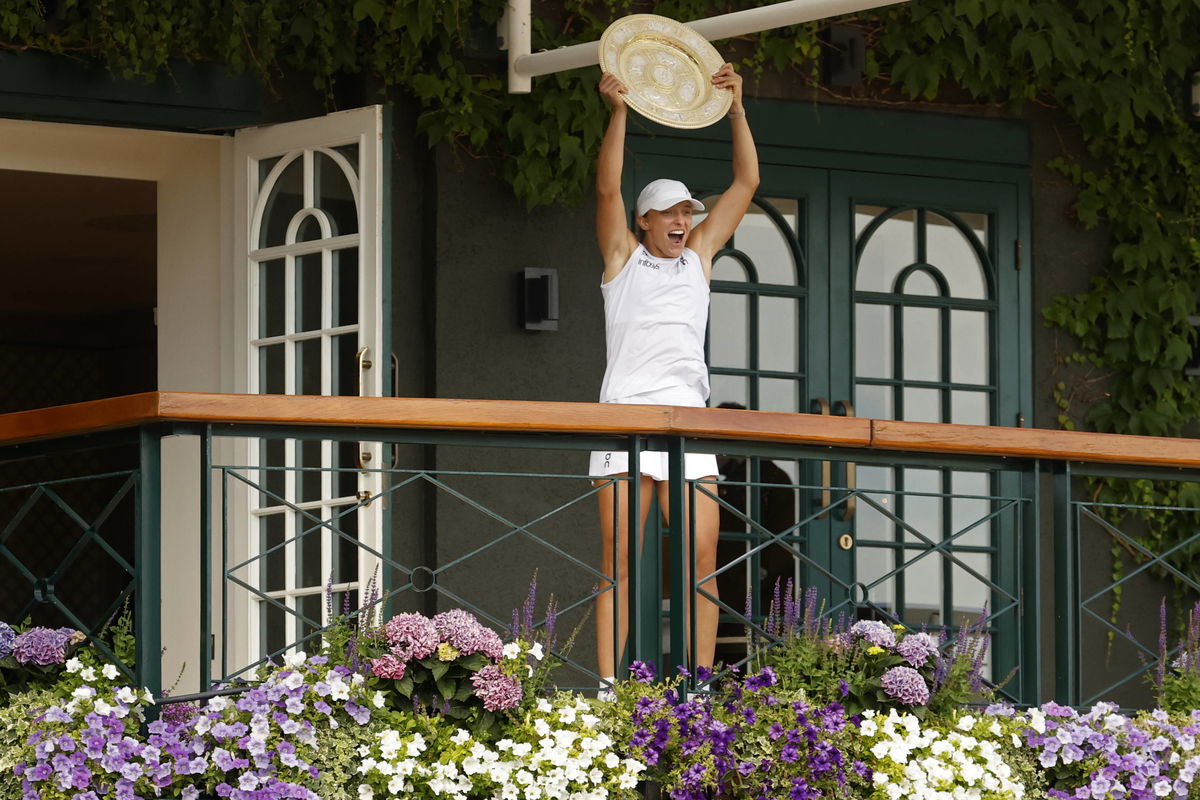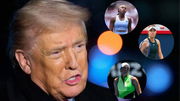
Imago
Tennis: Wimbledon Championships Jul 12, 2025 Wimbledon, United Kingdom Iga Swiatek POL runs onto the South West Hall Balcony holding the Venus Rosewater Dish after her match against Amanda Anisimova USAnot pictured in the ladies singles championship on day thirteen of The Championships Wimbledon 2025 at All England Lawn Tennis and Croquet Club. Wimbledon All England Lawn Tennis and Croquet Club ENTER STATE United Kingdom, EDITORIAL USE ONLY PUBLICATIONxINxGERxSUIxAUTxONLY Copyright: xGeoffxBurkex 20250712_gkb_sb4_280

Imago
Tennis: Wimbledon Championships Jul 12, 2025 Wimbledon, United Kingdom Iga Swiatek POL runs onto the South West Hall Balcony holding the Venus Rosewater Dish after her match against Amanda Anisimova USAnot pictured in the ladies singles championship on day thirteen of The Championships Wimbledon 2025 at All England Lawn Tennis and Croquet Club. Wimbledon All England Lawn Tennis and Croquet Club ENTER STATE United Kingdom, EDITORIAL USE ONLY PUBLICATIONxINxGERxSUIxAUTxONLY Copyright: xGeoffxBurkex 20250712_gkb_sb4_280
While lifting the Wimbledon trophy is the pinnacle of any tennis career, it also brings an unglamorous reality: a massive tax bill. For international players, winning at the All England Club doesn’t just mean prestige and a giant check but also a serious slice taken by HM Revenue & Customs.
Watch What’s Trending Now!
Wimbledon 2025 has set records with its prize pot, but so too will the taxman’s haul. With the UK’s complex rules for foreign athletes and the Additional Rate biting hard, even those knocked out early aren’t spared HMRC’s grip. Let’s break down just how much the 2025 champions—and even first-round participants—can expect to lose to the British tax office.
ADVERTISEMENT
Wimbledon 2025 winners face up to £1.3 million in taxes
This year’s singles champions will each receive £3 million in prize money—a bump of 11% from last year’s £2.7 million. It sounds like a dream come true. But the UK’s top tax rate quickly turns that dream into a reality check.
Analysis by the accountancy firm Blick Rothenberg suggests that each winner may see up to £1.3 million carved off for tax—around 43% of their winnings. That’s thanks to the UK’s 45% Additional Rate, which applies to all income over £125,140 for foreign athletes. And unlike UK residents, most international players don’t benefit from the £12,570 personal allowance, meaning nearly the entire sum is taxable at high rates.
Top Stories
Naomi Osaka Blasts Opponent Over Cold Handshake After Win: “Her Last Australian Open”

Madison Keys & Jessica Pegula Join Coco Gauff to Speak on Donald Trump’s Administration: “Big Melting Pot”

Naomi Osaka and Antonia Ruzic Refuse to Continue Australian Open Match- Here’s What Happened

Iga Swiatek Nearly Avoids Being Hit by Opponent’s Racket in Tough Australian Open Clash

Ben Shelton Wins Over Australian Open Crowd’s Heart With an Apology After Winning

It doesn’t end with prize money, either. The UK also taxes sponsorship and appearance income tied to a player’s time in Britain. Even a portion of global image rights deals can fall under HMRC’s gaze if they’re judged connected to Wimbledon or other UK activities.
ADVERTISEMENT
For top players, that £3 million prize may never see their bank account intact. It’s the price of winning the sport’s most prestigious event on British soil—and HMRC is ready to collect.
ADVERTISEMENT
First-round losers also fall into higher tax brackets
It’s not only the champions that get the tax hurt. Players that lose in the first round are uncomfortably close to HMRC too. The minimum guaranteed payout that singles players taken out in round one get this year amounts to £66,000, an increase of 10% from the figure of £60,000 used as the minimum payout level last year.
There’s one proviso, however. The UK’s 40% top rate tax rate is applied to all income that’s over £50,271. For the vast majority of foreign players, who won’t qualify for personal allowance, nearly the entire £66,000 salary is taxed at that rate. Realistically, that’s more than £25,000 gone to the taxman before the player has paid their coach or gotten on their plane back home.
It’s an unpleasant experience for players and qualifiers to grind their way into the main draw and then see most of their prize money disappear. Without good financial management or professional tax help, the best Wimbledon run creates a painful tax bill that catches players off guard.
ADVERTISEMENT
HMRC to collect £17 million in taxes from Wimbledon 2025 prize fund
The size of the tax taken at Wimbledon is enormous. This year’s total prize purse is £53.5 million, an increase of 7% from 2024’s total of £50 million. This year’s taxes taken at Wimbledon are estimated to be about £17 million, according to Blick Rothenberg, something of a bonanza that has in turn increased with Wimbledon’s growing prize money, the past decade having been no exception.

Imago
Catherine Princess of Wales presents the Venus Rosewater Dish to Iga Swiatek after her victory in the Ladies Singles Final Wimbledon Tennis Championships, Day 13, The All England Lawn Tennis and Croquet Club, London, UK – 12 Jul 2025London The All England Lawn Tennis and United Kingdom PUBLICATIONxINxGERxSUIxAUTxHUNxGRExMLTxCYPxROUxBULxUAExKSAxCHNxDENxINDxITAxPORxESPxSWExTURxMEXxCOLxVENxPERxECUxBRAxARGxCHIxURUxPARxPANxONLY Copyright: xJavierxGarcia/Shutterstockx 15392293ce
The tax expert of the firm, Robert Salter, terms Wimbledon “a cash generator of the first order for HMRC,” and that’s despite the fact that the players with limited image rights income remain in the higher rate tax bracket.
ADVERTISEMENT
The UK insists that tournament organizers withhold 20% of core prize money at the source, but that is merely the down payment. Players then have to produce UK tax returns to account for total UK-related income. All sponsorship arrangements that are engaged during Wimbledon, performance-related bonus payments, or image rights income that is considered to be associated with the UK may be taxed at the Additional Rate. It’s an agreement that’s designed to see the government get its share not only of prize money but also of the wider economic activity that’s generated as the consequence of having superstar players play Centre Court.
ADVERTISEMENT
Are there any deductions or workarounds?
While the tax rates are high, players do enjoy some latitude to cushion the blow. Players at the professional level, under UK law, qualify as self-employed contractors and, as such, are allowed to deduct particular expenses from their UK tax obligation.
Typical allowable deductions include travel to and from the UK, accommodation during the tournament, coaching fees, training costs, and agent commissions if contractually liable. These deductions can reduce taxable income, though they rarely erase the liability entirely.
But UK rules are tougher than in many other countries. Unlike certain tax-friendly jurisdictions where elite athletes negotiate favorable exemptions or caps, the UK expects international sports stars to pay full freight on any UK-linked earnings. Even global endorsement deals can be partially taxable if the player’s time in Britain triggers contractual bonuses or if they participate in local promotional events.
ADVERTISEMENT
It’s a tax regime that demands careful planning—and for players who go deep into the tournament, failing to prepare properly can mean an even more painful bill down the road.
Final thoughts: Prestige still trumps tax for top players
For all the talk of hefty tax bills and HMRC’s £17 million haul, Wimbledon remains the crown jewel of tennis. The chance to hold that iconic trophy on Centre Court still outweighs the financial sacrifice for most players.
ADVERTISEMENT
No one is turning down Wimbledon because of taxes. They know the rules. They know the cost. And they’re willing to pay. After all, there’s no price tag on joining the legends engraved on the trophy or hearing the roar of the Centre Court crowd.
It’s a reminder that while Wimbledon 2025 delivers record-breaking prize money, it also delivers record-high tax bills—yet that’s a price most champions are more than happy to pay for the honor of winning the world’s greatest tennis tournament.
ADVERTISEMENT
ADVERTISEMENT
ADVERTISEMENT
